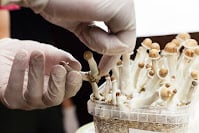Calls to Poison Centers Involving Psilocybin on the Rise Among Young People

Since 2019, calls to U.S. poison centers involving youth or young adults who took the psychedelic psilocybin have risen sharply, according to a study published today in the Journal of Adolescent Health. The timing is notable as 2019 was the start of a psilocybin decriminalization movement across numerous states and cities.
Rita Farah, Ph.D., and colleagues at the University of Virginia School of Medicine analyzed data from the National Poison Data System, which collects de-identified poison exposure data from centers across the country. The researchers examined all cases of psilocybin exposure between 2013 and 2022 involving young people aged 13 to 25.
Over the 10-year period, the researchers identified 4,055 calls for psilocybin exposure, of which about 66% involved psilocybin alone. The poison calls generally included a visit to a health care facility due to hallucinations or delusions, agitation, elevated heart rate, or confusion. The calls included two reported deaths, but both involved a secondary substance (fentanyl and amphetamine).
Between 2013 and 2018, the number of psilocybin calls per year remained steady among both adolescents (aged 13 to 19) and young adults (aged 20 to 25). Starting in 2019, however, the rates increased each year. In 2022, psilocybin-related poison calls by young adults had more than doubled compared with 2018 (to nearly 300 calls), while calls by adolescents had more than tripled (over 450 calls). The researchers noted that overall call volume to poison centers did not fluctuate significantly between 2013 and 2022.
Farah and colleagues noted that their analysis could not assess how psilocybin-related poison calls changed in specific regions where this drug has been decriminalized. “As psilocybin might become more available, continued surveillance is critical to inform lawmakers and help guide public policy,” they wrote.
To read more on this topic, see the Psychiatric News article “Marijuana, Hallucinogen Use Reach Historic Levels Among Young Adults.”
(Image: Getty Images/iStock/Moha El-Jaw)
Don't miss out! To learn about newly posted articles in Psychiatric News, please sign up here.





